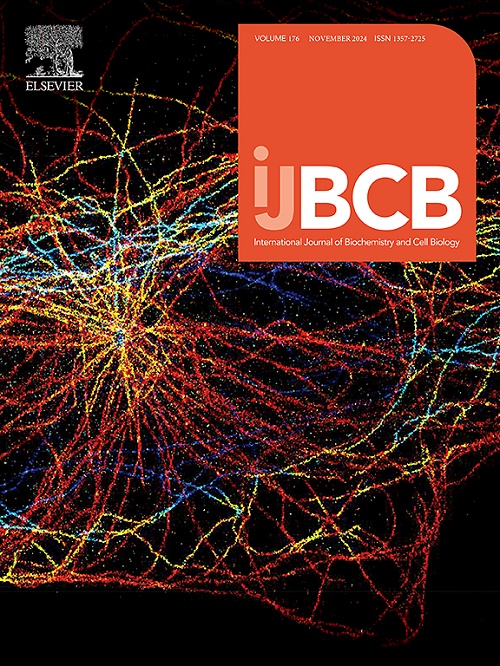微月桂通过下调炎症、色氨酸分解代谢和犬尿氨酸合成的抗癌作用
IF 2.8
3区 生物学
Q2 BIOCHEMISTRY & MOLECULAR BIOLOGY
International Journal of Biochemistry & Cell Biology
Pub Date : 2025-08-23
DOI:10.1016/j.biocel.2025.106852
引用次数: 0
摘要
新的治疗方法对防治乳腺癌至关重要,乳腺癌仍然是全球死亡的主要原因之一。由于全球癌症发病率不断上升,创新和有效的治疗和预防癌症的方法已成为权宜之计。近年来,将草药提取物和化疗结合起来作为一种尖端的癌症预防方法备受关注。野生寄生植物微兰花(Loranthus microranthus)广泛分布于世界各地,以其治疗用途而闻名。先前的临床前研究表明,微兰花叶和茎提取物具有抑制乳腺癌的潜力。通过网络药理学分析、体外和体内实验来研究微牛蒡提取物的抗癌作用是当前研究的目标。网络药理学分析揭示了微兰花与乳腺癌代谢相关的207个靶点和30个生物活性成分。根据KEGG分析和计算机模型,微乳杆菌控制着乳腺癌中色氨酸和氮的代谢。实验结果表明,微乳草显著降低干扰素-γ (IFN-γ)刺激的乳腺癌细胞中犬尿氨酸的合成,下调参与色氨酸分解代谢的重要蛋白,并且在给药剂量下对人乳腺癌细胞(mcf7和MDA-MB 231)没有细胞毒性作用。与IFN-γ处理过的乳腺癌细胞共培养的T细胞活力也明显增强。体内研究显示了类似的结果,微乳草治疗抑制炎症反应,IDO活性/表达,降低犬尿氨酸水平,阻断CTLA-4免疫检查点,最终增加dba诱导的乳腺癌大鼠的CD4+ T细胞群。本文章由计算机程序翻译,如有差异,请以英文原文为准。
Anti-cancer effect of Loranthus micranthus via downregulation of inflammation, tryptophan catabolism and kynurenine synthesis
New therapeutic approaches are essential in the fight against breast cancer, which remains one of the top causes of mortality globally. Innovative and efficient methods of treating and preventing cancer has become expedient since its incidence rates are rising globally. Combining herbal extracts and chemotherapy have drawn a lot of attention in recent times as a cutting-edge cancer prevention approach. The wild parasitic plant Loranthus micranthus is extensively distributed throughout the world and is well-known for its therapeutic uses. Previous preclinical investigations indicated that the leaves and stem extracts of L. micranthus had the potential to suppress breast cancer. Investigating the anticancer effects of L. micranthus extracts through network pharmacology analysis, in vitro and in vivo experiments is the goal of the current study. Network pharmacology analysis revealed 207 targets and 30 bioactive phytoconstituents of L. micranthus associated with the metabolism of breast cancer. L. micranthus controlled the metabolism of tryptophan and nitrogen in breast cancer, according to KEGG analysis and in silico models. The results of the experiment showed that L. micranthus significantly reduced the synthesis of kynurenine in interferon-γ (IFN-γ)-stimulated breast cancer cells, downregulated important proteins involved in tryptophan catabolism, and produced no cytotoxic effects in human breast cancer cells (MCF 7 and MDA-MB 231) at the administered doses. The viability of T cells co-cultured with IFN-γ-treated breast cancer cells was also markedly enhanced by L. micranthus pre-treatment. The in vivo investigation showed a similar outcome, with L. micranthus treatment suppressing the inflammatory response, IDO activity/expression, lowering kynurenine levels, blocking CTLA-4 immune checkpoint and finally increasing the CD4+ T cell population in rats with DMBA-induced breast cancer.
求助全文
通过发布文献求助,成功后即可免费获取论文全文。
去求助
来源期刊
CiteScore
8.10
自引率
0.00%
发文量
124
审稿时长
19 days
期刊介绍:
IJBCB publishes original research articles, invited reviews and in-focus articles in all areas of cell and molecular biology and biomedical research.
Topics of interest include, but are not limited to:
-Mechanistic studies of cells, cell organelles, sub-cellular molecular pathways and metabolism
-Novel insights into disease pathogenesis
-Nanotechnology with implication to biological and medical processes
-Genomics and bioinformatics

 求助内容:
求助内容: 应助结果提醒方式:
应助结果提醒方式:


